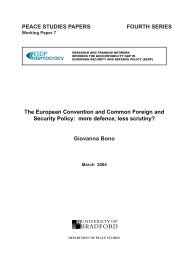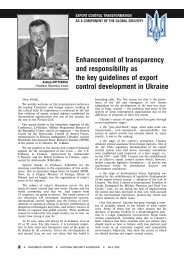Kharkov Police Academy (13 - DCAF
Kharkov Police Academy (13 - DCAF
Kharkov Police Academy (13 - DCAF
You also want an ePaper? Increase the reach of your titles
YUMPU automatically turns print PDFs into web optimized ePapers that Google loves.
Ukraine National <strong>Police</strong> <strong>Academy</strong><br />
Ukraine Verkhovna Rada<br />
<strong>Kharkov</strong>, <strong>13</strong> October 2005 Kiev, 14 October 2005<br />
Presentation<br />
„<strong>Police</strong> Reform in Europe and Ukraine: Plans and Trends“<br />
Dr. Peter Hobbing, Brussels/Freiburg<br />
<strong>Police</strong> reform is a universal topic: it is currently pursued anywhere in the world as can be seen<br />
from government websites from Azerbeidjan to Zambia. The theoretical concept of modern<br />
policing (as well as practical models intended) are comparable if not identical in the entire world<br />
among democratically oriented states. But, of course, current working sites within the reform<br />
process may vary according to the specific social, economic or geographical situation of each<br />
country.<br />
Whereas most countries in Western Europe and North America have established democracybased<br />
police-systems at the latest after WW2, this process is not yet accomplished in other<br />
parts of the world affected by long-term authoritarian systems, especially where combined with<br />
the experience of recent military conflicts. Within the European region, this applies particularly<br />
to the formerly communist countries of central and eastern Europe (CEE) and the former Soviet<br />
Union (FSU) (post-authoritarian situation) as well as the former Yugoslav states (post-conflict<br />
situation).<br />
1. Democratic policing, as commonly understood and endorsed by the UN and the Council of<br />
Europe 1 , comprises the following core elements:<br />
- provision of security to citizens and communities (rather than to a party or to the state)<br />
as the primary goal<br />
- accountability and transparency in the performance of duty<br />
- professionalism of service as primary objective in the sense of police possessing the<br />
necessary skills to perform their assignments<br />
- demilitarisation of police forces (militia forces, gendarmerie etc to be transformed in<br />
civil police)<br />
- representativeness of staff in relation to individual ethnic groups within multi-ethnic<br />
societies<br />
- integrity management as a central function of police administration,<br />
- semi-autonomous status of the police organisation and system<br />
- treatment of police as citizens<br />
2. Within the European Union, although the above core elements have become integral part of<br />
policing traditions, there is still the necessity of adapting systems to the changing needs of<br />
society. This is notably true in relation to the provision of improved police efficiency even in<br />
times of budgetary shortages/scarce resources.<br />
1 UN Code of Conduct for Law Enforcement Officials as adopted by GA assembly 34/169 of 17 December 1979;<br />
Council of Europe Recommendation Rec(2001) 10 on the European Code of <strong>Police</strong> Ethics of 19 September 2001<br />
1
2.1. Within national police organisations in the EU, reform processes are directed towards the<br />
better exploitation of existing resources notably by the following means:<br />
- restructuration of police services in view of reducing the number of separate forces and<br />
avoiding duplication of efforts in Belgium: federal level (including the central services of the<br />
former Gendarmerie and the Judicial <strong>Police</strong>) and the local level (former municipal police forces<br />
and territorial brigades of the former Gendarmerie)<br />
- transformation of border guard/border police (having become largely superfluous due to<br />
European integration) into a federal police in Germany: the former Bundesgrenzschutz became<br />
the „Bundespolizei“ with competences extending to the entire territory (instead of the border area<br />
only)<br />
- alignment of structures and operating modes of the 43 independent police forces in place<br />
in the United Kingdom. The overall aim is to allow police staff to focus its working capacity on<br />
genuine police work (crime prevention and detection) by (a) reducing the heavy bureaucratic<br />
burden currently on the shoulders of all officers and (b) transferring minor aspects of disorder to<br />
suitable support staff („Community Support Officers“), which will be part of an „extended police<br />
family“. Important to note, that this does not represent a transfer of police powers to private<br />
entities, because the state police does maintain the control and supervision of all support staff.<br />
2.2. At the central EU level, the reform trend aims at an increased interlocking of national<br />
police services, rather than creating a single EU police service.<br />
The specific EU challenge lies in the fact that the common area of Freedom, Security and Justice has to<br />
be built upon the co-existence of initially 12, then 15 and 25 distinct legal systems; differently from the<br />
economic field, there is no intention of aligning basic structures such as harmonizing criminal codes<br />
or a creating a uniform EU police service. Much rather, enforcement integration in the EU relies on the<br />
idea of creating „catwalks“ between the different national levels, in order to resolve cross-border<br />
situations.<br />
Main pillars of the reform are an enhanced level of law enforcement cooperation 2 and joint<br />
institution-building in terms of common coordination and support structures.<br />
Major achievements include the creation of a number of institutional structures such as the<br />
European police office Europol (created in 1994/99 and based in The Hague, NL), the <strong>Police</strong><br />
Chiefs Task Force (EPCTF since 2000) and the <strong>Police</strong> College CEPOL (since 2000, based in<br />
Bramshill, UK). There are furthermore technical infrastructures, in particular communication and<br />
database networks such as the Schengen Information System SIS, soon to be followed by gthe<br />
next generation SIS II which is not only capable of providing service to all 25 (and future)<br />
Member States but also to include finger prints, biometric data and photos. Also there are funding<br />
programmes such AGIS to financially promote EU-wide cooperation between law enforcement<br />
services.<br />
Another cornerstone of joint EU policing concerns the integrated management of the external<br />
EU border.<br />
The abolition of all controls at internal borders puts additional importance to the existence of smooth but<br />
effective controls at the external EU borders which have to take into account the interests of all 25<br />
2 to be discussed in more detail in the presentation on law enforcement cooperation (see separate sheet)<br />
2
Member States. In order to ensure such efficiency and help to share the burden of Member States on the<br />
periphery of the Union, a system of integrated border management is gradually put into place.<br />
The primary result of this initiative, launched by the Laeken European Council of 2001, is the<br />
creation of the European Border Agency, operational since 1 May 2005, based in<br />
Warsaw/Poland and headed by the Finnish border guard colonel Ilkka Laitinen. Furthermore<br />
more than 20 Joint <strong>Police</strong> Centres, composed of enforcement officials of neighbouring Member<br />
States, have been set up in border zones all through the EU territory, in order to facilitate crossborder<br />
action of operational and judicial services.<br />
3. <strong>Police</strong> reform in Ukraine has been marked by a post-authoritarian situation characteristic for<br />
all FSU states. Main problems to be faced by FSU after independence related to the policingconcept<br />
„inherited“ from the Marxist-Leninist past, such as<br />
- police being closely linked to the party-state rather than oriented towards the<br />
protection of citizens and communities<br />
- police as a militarised body („militia“)<br />
- centralised hierarchical structures and little decision-making power of the individual<br />
police officer.<br />
Considerable progress was made in the militia/police reform since 1991, notably through<br />
agreement reached on the following crucial items 3 :<br />
- militia to focus mainly on the individual and his/her interests<br />
- simplification and decentralisation of militia structure<br />
- review of information policy, salary/rank structures and other internal organisation<br />
features<br />
Foreign assistance to police reform has been provided notably through the Council of Europe in<br />
view of the creation of a Network of <strong>Police</strong> and Human Rights co-ordinators (1997-2000) and,<br />
as a joint programme with the European Commission, the training of police staff in human<br />
rights to be respected in daily police work (2004). The European Commission has supported<br />
police-specific projects especially in the framework of democratic institution-building and<br />
cooperation in justice and home affairs (cf. 2001 Action Plan). Specific allocations were made to<br />
the improvement of border-crossing capacity at various crossing points (Rava Ruska,<br />
Uzhgorod), fight against terrorism, asylum management (altogether 72 million EURO between<br />
2000 and 2005).<br />
The reform process has nevertheless been hampered by lack of financial resources which seem to<br />
have slowed down the practical implementation of reforms intended, notably the demilitarisation<br />
of the militia, appropriate increase of salaries to prevent vulnerability of officers to corruption,<br />
recruitment of high-quality staff. In addition, limited state capacities in law enforcement have led<br />
to the transfer of public tasks to private security firms („multilateralisation of policing“).<br />
Relevant international organisations and police experts, assisting in the police reform, stress<br />
several items of major importance still to be completed:<br />
- reduction of the bureaucratic burden on police staff, which make that „perhaps as few<br />
as one quarter are directly employed to protect public order or tackle crime“.,<br />
3 cf. Conception of MIA of Ukraine System Development of 1996<br />
3
- strengthening of militia/public partnerships at the local level to enhance<br />
decentralisation<br />
- revision of training requirements in view of providing appropriate practical skills for<br />
each rank and avoiding excessive theoretical/legal training (e.g. provide police managers<br />
with effective management techniques rather than requiring a law degree).<br />
The importance of police reform in the framework of EU accession/neighbourhood criteria<br />
should not be underestimated: in a recent case, association negotiations were stopped because of<br />
non-compliance with police criteria of a partner country (Bosnoia-Herzegovina).<br />
4
















